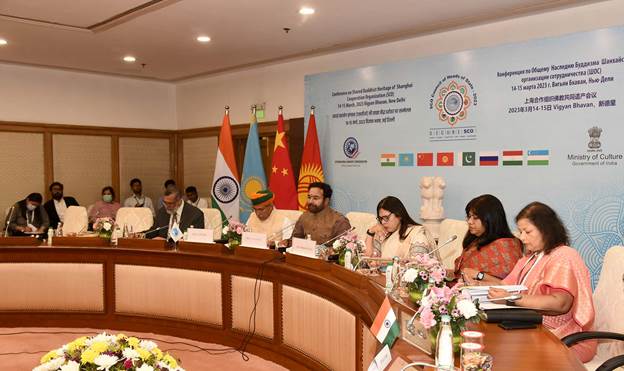Inauguration of SCO International Conference on “Shared Buddhist Heritage” held
The two-day international conference of Shanghai Cooperation Organization (SCO) on “Shared Buddhist Heritage” was inaugurated at Vigyan Bhawan in New Delhi today, with focus on India’s civilizational connect with the SCO nations.
The session was graced by Union Minister for Culture, Tourism and DoNER Shri G.K Reddy; Minister of State for Culture and External Affairs Smt Meenakashi Lekhi; Minister of State for Culture and Parliamentary Affairs Shri Arjun Ram Meghwal; DG, International Buddhist Confederation, Shri Abhijit Halder and delegates from China, Pakistan, Russia, Bahrain, Myanmar, UAE.
On the occasion Shri G. K Reddy said that the conference will not only celebrate Buddhist common heritage but will also build stronger and deeper bonds amongst our countries. He also said that Buddhism with its profound vision of eternal harmony in the world has spread far and wide and it touched the lives of inhabitants in all the SCO countries centuries ago. Today, we have all gathered here, at a first of its kind conference, because of this underlying link that binds us. The purpose of this Conference is to renew trans cultural links and shared histories between the nations gathered here, the Minister explained.
Addressing the participants, Shri Arjun Ram Meghwal said that teachings of Buddha about self-realization and self-examination are very relevant for 21st century also. The Minister suggested that the SCO countries should take up programmes and projects on our shared Buddhist heritage which binds us together .He also suggested to make Buddhist manuscripts in Pali to be translated into a common language for SCO countries and will make them accessible to all the countries.
In her address, Smt. Meenakashi Lekhi said that heritage and history connects all the SCO countries. She also said that Lord Buddha talked about value based living which is essential for our co-existence. SCO members are connected by Buddhist philosophy which can make SCO a formidable force in terms of ethics and value system, the Minister added
The event, a first of its kind, under India’s leadership of SCO (for a period of one-year, from 17 September, 2022 until September 2023) brings together Central Asian, East Asian, South Asian and Arab countries on a common platform to discuss “Shared Buddhist Heritage”. The SCO countries comprise of Member States, Observer States and Dialogue Partners, including China, Russia and Mongolia. Several scholars – delegates from SCO are resenting research papers on the topic including from Dunhuang Research Academy, China; State Museum of the History of Religion, International Theravada Buddhist Missionary University, Myanmar, among others.
The two-day programme is being organized by the Ministry of Culture, the Ministry of External Affairs and the International Buddhist Confederation (IBC-as a grantee body of the Ministry of Culture). A number of Indian scholars of Buddhism are also participating in the event.
The aim of the Conference is to re-establish trans-cultural links, seek out commonalities, between Buddhist art of Central Asia, art styles, archaeological sites and antiquity in various museums’ collections of the SCO countries.
One of the natural marvels in this world is the evolution and spread of ideas, since times immemorial. Crossing effortlessly, formidable mountains, vast oceans and national boundaries; ideas that find a home in distant lands; getting enriched with the existing cultures. So is the uniqueness of Buddha’s appeal.
Its universality crossed both time and space. Its humanistic approach permeated art, architecture, sculpture and subtle attributes of human personality; finding expression in compassion, co-existence, sustainable living and personal growth.
The Conference is a unique meeting of the minds, where countries from different geographical regions but with a common thread connecting them based on a shared civilization legacy, strengthened by Buddhist missionaries who played a major role in integrating various cultures, communities and regions in the entire Indian subcontinent and Asia will discuss for two days’ various themes, chalking out ways to continue the age-old bonds into the future.

